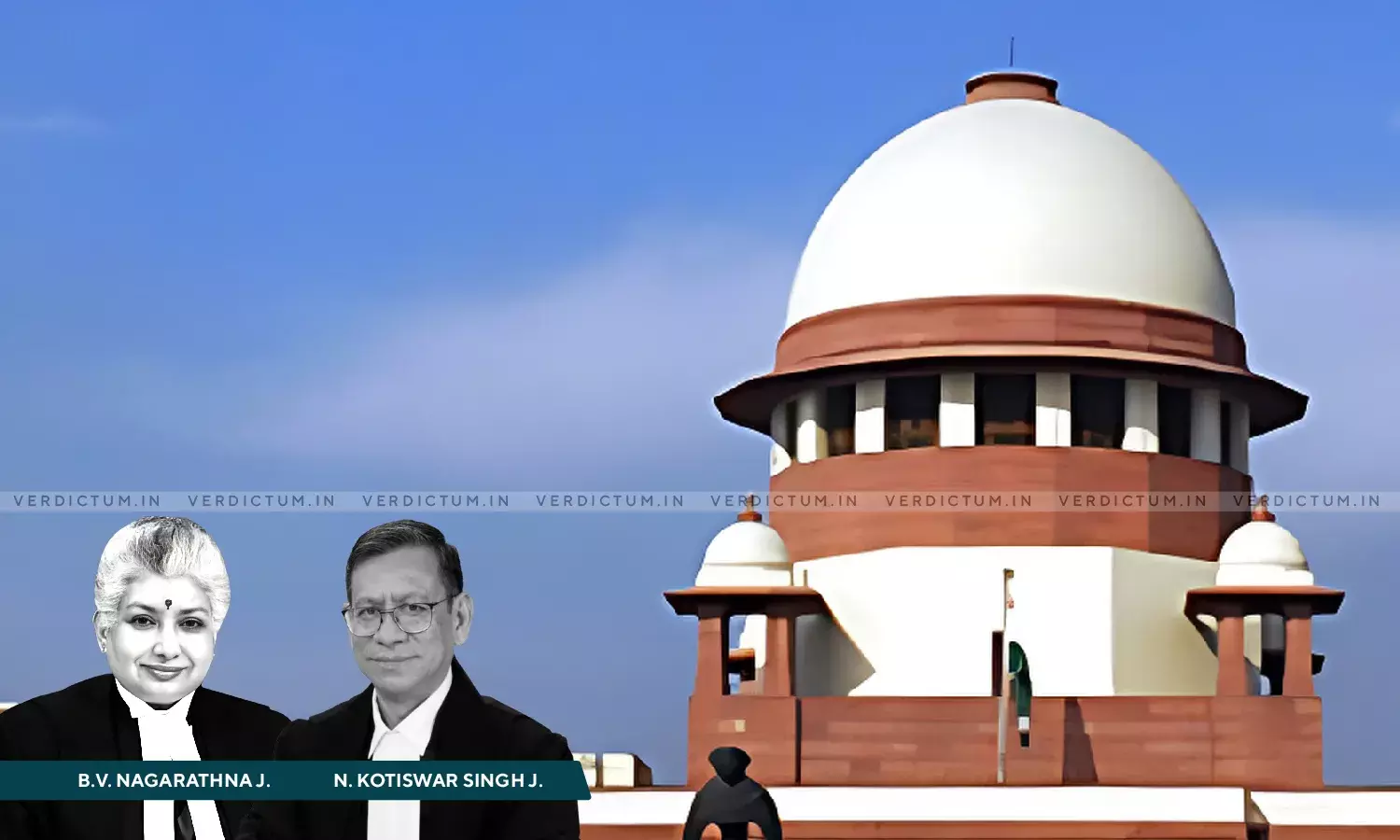HC Must Reassess Facts, Evidence & Findings To Decide Appeal Against Conviction; Pendency of Case Can’t Come In Way of Court’s Duty When Person's Liberty Is At Stake: SC
The Supreme Court remanded a criminal matter back to the Calcutta High Court and observed that the High Court shall, as an appellate Court, re-assess the facts, evidence on record and findings to arrive at a just conclusion in deciding whether the Trial Court was justified in convicting the accused or not.
The appellant approached the Apex Court challenging the judgment of the Calcutta High Court vis-à-vis not only on the merits of the said judgment but also the approach of the High Court in considering the Criminal Appeal filed by the appellant.
The Division Bench comprising Justice B.V. Nagarathna and Justice Nongmeikapam Kotiswar Singh asserted, “We are also cognizant of the large pendency of cases bombarding our courts. However, the same cannot come in the way of the Court’s solemn duty, particularly, when a person's liberty is at stake.”
Advocate Ranjan Mukherjee represented the Appellants while Advocate Srisatya Mohanty represented the Respondents.
The appellant, in this case, was charged with an offence under Sections 376, 511, 354 of the Indian Penal Code, 1860. The Additional District and Sessions Judge, convicted the appellant herein and sentenced him to rigorous imprisonment for a period of two years with fine of Rs.2,000 and in default simple imprisonment for a period of one month with regard to Section 354 of the IPC for a period of seven years with fine of Rs 10,000 and in default simple imprisonment for a period of three months for the offence punishable under Sections 376 and 511 of the IPC. The sentences were to run concurrently.
When the matter reached the High Court, the appellant dismissed the appeal and sustained the judgment of conviction. Hence, this appeal was filed before the Apex Court. It was the appellant’s case that as the High Court was considering an appeal against conviction passed by the Fast Track Court, the High Court ought to have considered the evidence on record independently and passed a judgment one way or the other in the appeal; however, the High Court simply reaffirmed the conviction in the absence of any independent reasoning.
On a perusal of the impugned judgment, the Bench noted that the judgment had been sub-divided into the various sub-topics, namely, the Appeal, the Prosecution, the Defence, the Evidence and Analysis of evidence which was based on the Fast Track Court’s findings in the matter and thereafter the appeal had been dismissed.
“While hearing the appeals under Section 374(2) of the Code of Criminal Procedure, 1973 (CrPC), the High Court is exercising its appellate jurisdiction. There shall be independent application of mind in deciding the criminal appeal against conviction. It is the duty of an appellate court to independently evaluate the evidence presented and determine whether such evidence is credible. Even if the evidence is deemed reliable, the High Court must further assess whether the prosecution has established its case beyond reasonable doubt. The High Court though being an appellate Court is akin to a Trial Court, must be convinced beyond all reasonable doubt that the prosecution's case is substantially true and that the guilt of the accused has been conclusively proven while considering an appeal against a conviction”, the Bench explained.
As per the Court, the necessity of this exercise arises from the fact that a conviction curtails the personal liberty of the accused in the incessant future. Hence, the High Court must provide clear reasons for accepting the evidence on record. “Mere concurrence with the findings of the Trial Court is insufficient unless supported by a well-reasoned independent justification”, it added.
“As the first appellate court, the High Court is expected to evaluate the evidence including the medical evidence, statement of the victim, statements of the witnesses and the defence’s version with due care. While the judgment need not be excessively lengthy, it must reflect a proper application of mind to crucial evidence. Albeit the High Court does not have the advantage to examine the witnesses directly, the High Court shall, as an appellate Court, re-assess the facts, evidence on record and findings to arrive at a just conclusion in deciding whether the Trial Court was justified in convicting the accused or not”, the Bench said.
The Bench observed that the impugned judgment had neatly sub-titled various aspects of the case, but the independent consideration of the evidence on record was conspicuous by its absence inasmuch as certain paragraphs recorded the oral evidence and also listed the exhibits which were produced in the said case however, the said evidence was not considered by the High Court so as to ascertain whether the Fast Track Court was justified in passing a judgment of conviction and sentencing the appellant. The analysis of the evidence was on the basis of what the Fast Track Court had recorded and arrived at its findings, the same was reproduced in various sub-paras and consequently, the appeal was dismissed.
“We find that the High Court ought to have considered the evidence on record in light of the arguments advanced at the bar and thereafter ascertained whether the Fast Track Court was justified in passing the judgment of conviction and imposing the sentence. The same being absent in the impugned judgment, for that sole reason, we set aside the same”, the Bench said.
Allowing the appeal, the Bench said, “We remand the matter to the High Court and restore the CRA 111/2019 on the file of the High Court. We request the High Court to rehear the appeal and pass a fresh judgment, bearing in mind the observations we have made above, in accordance with law.”
Cause Title: Amar Sardar v. The State of West Bengal (Neutral Citation: 2024 INSC 1040)
Appearance:
Appellants: Advocates Mr. Ranjan Mukherjee, Anindo Mukherjee, AOR Rameshwar Prasad Goyal
Respondents: Advocate Srisatya Mohanty, AOR Astha Sharma, Advocate Abhijit Pattanaik




